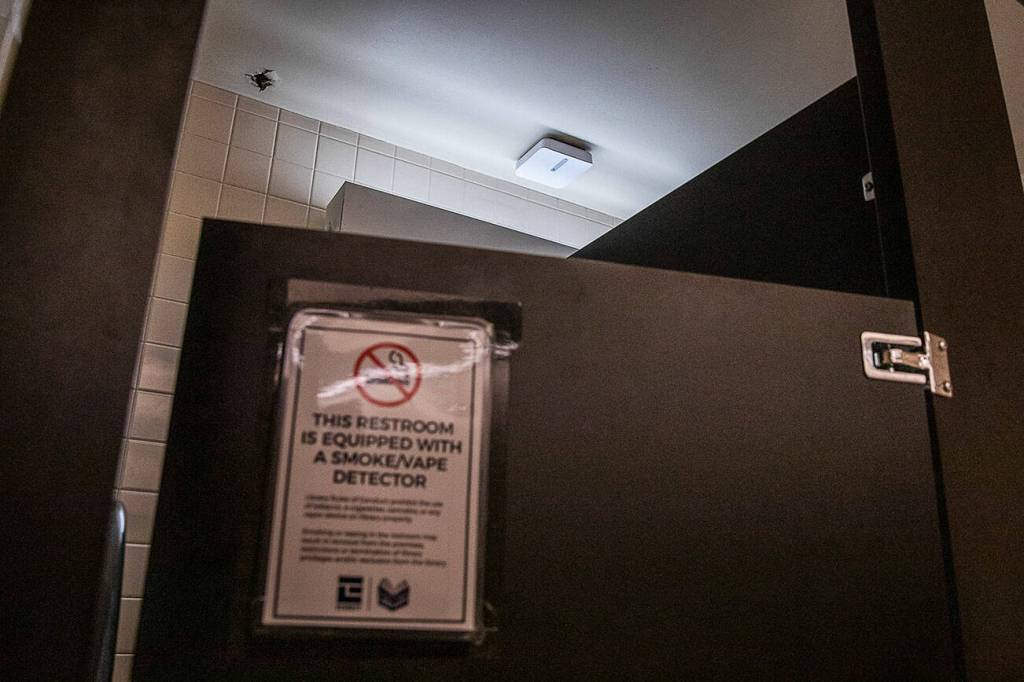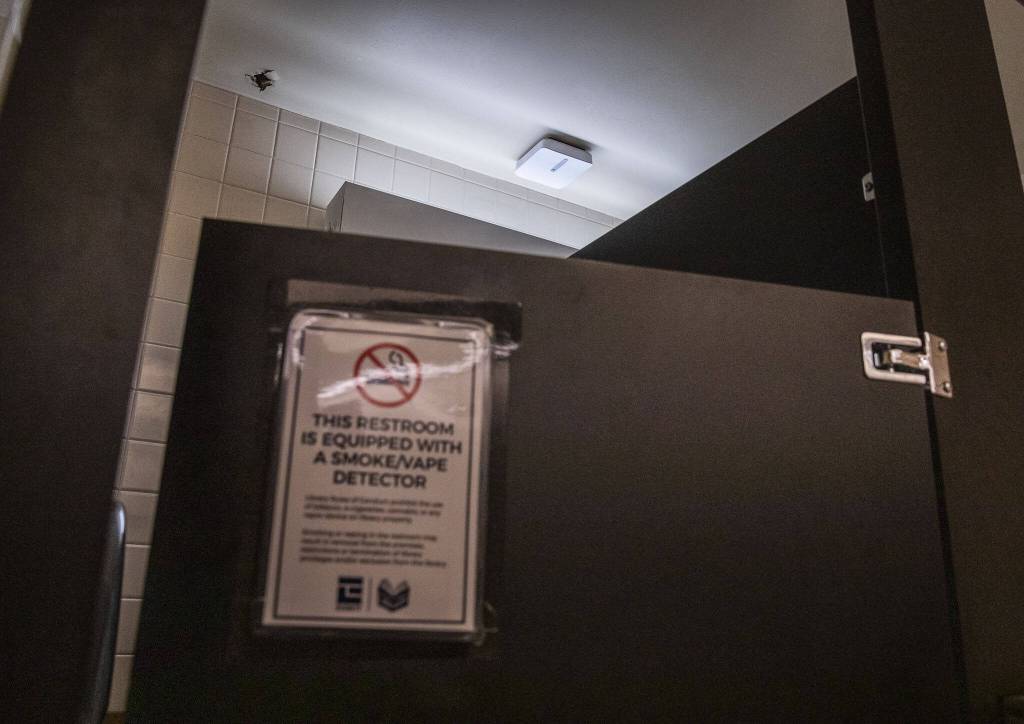Everett library’s sensors to detect drug use are constantly buzzing
Published 1:30 am Thursday, July 20, 2023


EVERETT — Pervasive drug abuse has hit Everett’s library bathrooms, including in the main branch’s area for children.
Earlier this year, the Everett Public Library quietly launched sensors in every bathroom at its Evergreen and main branches. The devices, about the size of a home’s wireless router, were installed in April after persistent problems with people suspected of using drugs in the bathrooms.
In just the first two months, the sensors sent over 100 alerts. In the same period, staff temporarily banned a couple dozen people from the libraries for code of conduct violations, mostly for drug use.
Library Director Abby Cooley said the 42 sensors help ensure the public health of guests and employees at the branches. For years the restrooms have had sharps containers to dispose used needles.
“Our staff safety and customer safety is the most important factor in everything we do,” Cooley said.
Everett paid about $61,000 for the Verkada air quality sensors with licenses for three years, plus another $10,000 for staff time to connect and install them, city spokesperson Simone Tarver said.
In some ways, it is reminiscent of issues that hit a tipping point in 2017.
But some of the 43 library workers said the devices point out the emerging and enduring dangers they are exposed to. They spoke to The Daily Herald on condition of anonymity for fear of retaliation.
Their concerns led to meetings between the city and union representatives for Everett’s library employees in AFSCME Council 2.
“People that work in the library didn’t go into it thinking they were going to be social workers as well,” said Roger Moller, a union representative for Everett city employees. “But it’s turned out that’s what they have to do.”
Before the devices were installed, some employees reported feeling ill after entering the bathrooms where someone was suspected of smoking or vaping. Cooley said there were at least a few instances with “very minor” symptoms.
Everett’s bathroom sensors only send an alert when small particulates, pollutants, volatile organic compounds and other conditions exceed a set threshold. The devices don’t identify what is in the air, only when an excess of something exists. Alerts also go out if someone tries to remove the sensors.
The sensors have other capabilities, but Everett chose to activate just those two functions, Tarver said.
There were three alerts from a sensor in the family bathroom in the youth services area of the library through early June, according to data obtained by The Daily Herald through a public records request.
Alerts are sent to all staff in the library and the contracted security guards. Whoever is available and nearby is expected to respond to the bathroom from where the alert came, Cooley said. They knock on the door to the bathroom, identify who they are and that they represent the library, ask people inside to leave because the sensor was triggered, and inform whoever was inside that smoking and vaping are prohibited at the library.
If staff suspect someone used drugs, based on what they see or smell, they can issue a 60-day exclusion. Staff don’t check for paraphernalia, Cooley said.
Once the bathroom is clear, staff lock it and keep it closed until the sensor sends another alert that the air is in the “normal range,” she said.
“Our goal is to provide a welcoming and gracious space for our entire community,” Cooley said.
But some employees said that process and the volume of alerts create new responsibilities that take time out of their days.
The library employees’ union has asked the city to hire more security at its branches to help, especially with “unruly patrons, people fighting, and security issues for patrons,” Moller said.
“We’re frustrated by the speed or lack thereof of addressing the issues,” he said. “We understand that there’s a bureaucracy involved and things don’t happen overnight, but we’d like to see things move more quickly.”
Everett’s not alone in having this problem or trying this solution. Schools have used similar devices, largely to deter electronic cigarette use.
Seattle Public Library began using the devices in March at its Lake City branch restrooms, spokesperson Laura Gentry wrote in an email. The sensors sent 182 alerts between late March and late June, with most of the notices being related to smoke and vapor.
The Seattle library’s response protocol is similar to Everett Public Library’s.
Marissa Baker, a University of Washington professor of environmental and occupational health sciences, said public places such as buses, grocery stores and libraries are at the intersection of health issues around drug use.
“It’s important to recognize that protecting the health of the workers is also going to be beneficial to the public in spaces like this,” Baker said.
The risk of getting a toxic dose from exposure to smoke or vape, even from methamphetamine or fentanyl, is “pretty low” and the effects of second-hand exposure are still being studied, she said.
There isn’t data for worker exposure to illicit drugs, such as fentanyl or meth, according to the Centers for Disease Control and Prevention. The federal agency also notes there are no exposure limits to such drugs for workers.
No employees have reported feeling ill from smoke or vapor exposure since installing the sensors, Cooley said.
But people can experience stress from responding to drug use at their work, Baker said.
She said there are several measures workplaces should take to ensure safety:
• Instruct workers how to respond;
• Have an incident response plan;
• Ensure naloxone (commonly called by the brand name Narcan) is available and workers know how to use it;
• Bolster cleaning protocols;
• Improve filtration and ventilation;
• Allow workers to share concerns and grievances.
The sensors could work as a deterrent to drug use in the library bathrooms, Baker said, in addition to letting people know when it may be unsafe to enter while smoke or vapor lingers.
Jason Cockburn, the founder of Everett-based Second Chance Foundation that supports people recovering from addiction, homelessness and incarceration, was glad to hear the bathrooms are at least still open. Libraries, and specifically their restrooms, are one of the few accessible spaces for homeless people during the day in Everett, he said.
Everett does not have a daytime shelter for adults, so once overnight beds are closed, the library is one of the few places with air conditioning, electrical outlets, heat and water.
“They’re not flat-out saying you can’t use our bathroom,” Cockburn said.
The city paid for a social worker program based in the library’s main branch at 2702 Hoyt Ave. A second social worker started there in June.
Ben Watanabe: 425-339-3037; bwatanabe@heraldnet.com; Twitter: @benwatanabe.






